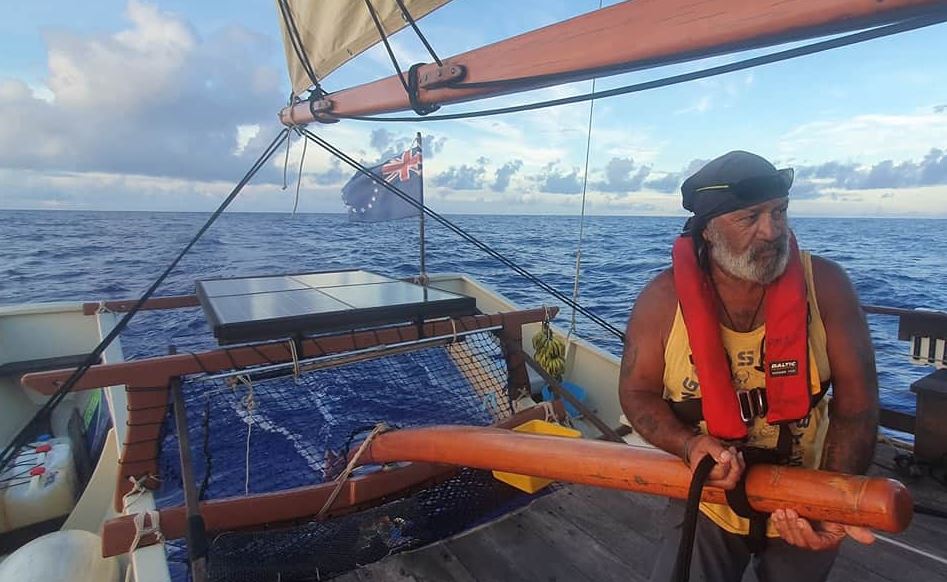LETTER TO EDITOR: Paikea and the whale
Saturday 18 February 2023 | Written by Supplied | Published in

Tetini Pekepo - SUPPLIED FACEBOOK
I’ve been following with interest the discussion of Paikea in this newspaper, and I’m writing to add some of my personal experiences, encounters, and reflections to the conversation. In either the late 70s or early 80s, I visited a marae in Whangara on the east coast of New Zealand.
I was with either the Hawke’s Bay or Manawatu representative rugby league team – I played with both but can’t recall which I was with at the time. The name of the marae where we stayed was Whitireia. The top figure, or tekoteko, of the carved meeting house where we slept depicted a man sitting on a whale. When I enquired about the figure, I was told that he was an ancestor named Paikea, who had come ashore on the back of a whale.
Fast-forward 20-odd years and an acquaintance I met through tattooing, a well-known kaikōrero from Aotearoa named Derek Lardelli, came to the Cook Islands with a group from Whangara. The intent of their visit was to acquaint themselves with their long lost whanaunga, as Derek had learnt that his tupuna, Paikea, came from Mauke.
Fast forward again to the year 2015. I was on board Marumaru Atua, sailing with two other paʻi moana from Aotearoa to the Cook Islands to celebrate 50 years of self-governance. After spending a few days in Rarotonga, we visited some of the southern pa enua. When we were on our way to Nga-pu-toru, another well-known kaikōrero on board the Haunui vaka said he wanted to visit Mauke, as members of the Matau O Maui paʻi were from Whangara. He wanted to introduce them to the Hawaiki of their tupuna. While in Mauke, the well-known tumu kōrero, the late Mapu Taia, told us the story of a man he called Kapu-o-te-rangi, or Paikea, on the site where Paikea’s wife sat helplessly and watched as his fishing vaka was blown out of her sight by a sudden storm. When the storm eased up, Paikea was far out to sea. A whale approached and guided him to Aʻuaʻu Enua, where he was welcomed for a while. According to Papa Tom Davis, he later started to make himself unwelcome. Luckily, a paʻi moana with a tere from Takitumu district visited Mangaia. The leader of that group was killed, so there was no one to help return the paʻi back to Rarotonga. Paikea said he would captain the paʻi. According to Papa Tom, the paʻi was crewed by both Mangaian and Maukean people.
When I was in Aotearoa in 2009, helping with the construction of a fleet of vaka moana, I did a little looking around for places that had links to the Pacific. I found that a small coastal town in the Gisborne area on the east coast has the name Anaura. I found out that the name means red cave – a reference to the island of Mangaia. I also found that the paʻi Horouta stopped at Great Mercury Island just off the top of Coromandel Peninsula and gave it the name Ahuahu, presumably after Aʻuaʻu.
Carver Nick Tupara, whose tupuna were also from the east coast of New Zealand, once turned up on my doorstep wanting to know where certain ancient chants he knew had come from. I connected him to the late Maui Toa, who at the time worked for the Ministry of Cultural Development. He said the chants had come from the island of Mangaia.
All of this leads me to wonder: if Paikea was actually from Mauke and only stayed in Aʻuaʻu for a short time, then why was Mangaia or Aʻuaʻu so prominent a part of his journey to Aotearoa?
Our tupuna talked about using the stars as stepping stones, but of course that was a metaphorical, poetic way of saying they used the stars to guide them. It seems to me that the story about Paikea arriving on the back of a whale is also a metaphor. I’ve encountered a lot of whales on my voyages across and around the Pacific aboard double-hulled voyaging canoes. Whales often approached the canoes when they sensed distress. They are in tune enough to be able to know when someone needs guidance and assistance. It is not difficult for me to believe that a whale led Paikea to safety. Saying he arrived on a whale’s back just sounds better around an open fire.
Tetini Pekepo









































